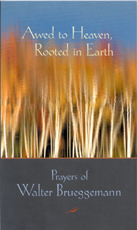Walter Brueggemann is Professor of Old Testament in the William Marcellus McPheeters Chair at Columbia Theological Seminary, Decatur, Georgia. His classic work Theology of the Old Testament is widely admired and used. This professor always starts his classes with a prayer. He states: "It is a long-standing practice to open seminary classes with prayer, a practice well-honored in the lectures of John Calvin. The substantive intention of such prayer is to invoke God's guidance and the teaching presence of the spirit, acknowledging that the learning now to transpire is not any ordinary learning such as the transformation of information, but rather is an exercise in faith, obedience, and praise. That is ,'loving God with one's mind.' "
Brueggemann also sees this collection as an aid to those interested in public prayers. Finally, it is his way of paying tribute to the students he has taught over the years at Eden Theological Seminary and Columbia Theological Seminary. Editor Edwin Searcy, pastor of University Hill Congregation in Vancouver, British Columbia, notes that the prayers bring to mind the speech of the psalms and the prophets. He also respects their pastoral tone and the alchemical process whereby the classroom is capable of becoming a congregation.
One of the first things we notice is Brueggemann's reverence for God, who doesn't match our preconceptions or fit into our conceptual boxes. He honors the mystery of the Creator and the subtle ways in which grace is revealed. Again and again, these prayers point out the various strategies we have devised to push the Holy One to the periphery of our daily activities. In one of many bold images, Brueggeman asks God "to re-brand us, transform our minds, renew our imagination." All too often we are enslaved to other brands — "winning with Nike, pausing with Coca-Cola, knowing and controlling with Microsoft." In another daring and creative prayer, he asks: "Be our primary disease, and infect us with your justice; Be our night visitor, and haunt us with your peace." These images free us from confining God to tried-and-true petitions. Many prayers have a social edge and contain references to trouble spots around the world.
